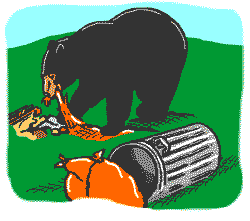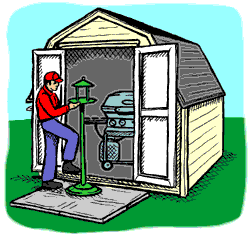
How To Avoid Problems With Black Bears
 For those who choose to reside in a rural area, increased interaction with wildlife is bound to occur. Real black bears aren't the cuddly critters portrayed in cartoons. They are large powerful animals that should be treated with caution and respect.
For those who choose to reside in a rural area, increased interaction with wildlife is bound to occur. Real black bears aren't the cuddly critters portrayed in cartoons. They are large powerful animals that should be treated with caution and respect.
Black bears are abundant here and can be found in most areas of the province. Normally shy and avoiding human contact, bears will venture into settled areas in search of food when natural food sources are scarce. Their quest often results in property damage and unwanted encounters with people. Nearly all problem bear situations are the result of opportunity - the availability of crops, human food or food waste.
Bears are intelligent and curious. They are resourceful and persistent when it comes to locating and acquiring food. When enticed by the smell of something to eat, bears will overturn garbage cans, green carts and bird feeders, break into buildings or vehicles, and damage crops, orchards and beehives. If a bear is successful at obtaining food, it will continue to return, and in the process will become increasingly less afraid of people. Relocation of these "spoiled" bears is seldom successful as there are few areas in Nova Scotia where they can be released and not become someone else's problem.
Practicing some preventative steps can reduce the odds of attracting bears around your house and property, your campsite or when traveling in the woods.
....At Your Rural Home
 Store garbage indoors or in metal bear-proof containers. On collection day, put garbage out as close to pick up time as possible. If you’re going to miss collection day, take garbage to the disposal site before you leave.
Store garbage indoors or in metal bear-proof containers. On collection day, put garbage out as close to pick up time as possible. If you’re going to miss collection day, take garbage to the disposal site before you leave.-
Never put meat, fish, bones or seafood shells in the compost. Turn compost often to prevent odors and hasten decomposition. Apply lime to reduce odor.
-
Keep your green cart in a shady area away from forest cover. Put meat or fish scraps in a plastic container or bag and store in the freezer until collection day. Rinse your cart periodically.
-
Keep barbecue grills clean and free of grease. The smell of animal fat and barbecue sauce may attract a hungry bear. Store the barbecue indoors if possible.
 If pets are fed outside, remove spillage and leftovers promptly.
If pets are fed outside, remove spillage and leftovers promptly.-
Remove bird feeders once their natural food sources are available. If you continue bird feeding, and if a bear has been seen in your neighbourhood, put feeders indoors at night and clean up spillage.
-
Pick fruit and berries growing near your home that may attract bears. Even if you don’t want the fruit, dispose of it before attracts a bear’s attention.
....At Your Camp or Cottage
-
Make sure garbage containers have a secure bear-proof lid and are emptied frequently. Keep garbage containers away from dense forest cover. When leaving camp take the garbage with you.
-
Keep the kitchen clean and well ventilated to remove cooking odors.
-
Foods with long-lasting odors such as fish and bacon, should be cooked outdoors.
-
Never dump food waste or cooking fats near the camp.
-
Never leave food that may spoil (meat, bread, fruit etc.) in your camp or cottage when you’re not staying there.
-
Periodically inspect windows, doors, and siding for signs of rot which can significantly weaken the structure.

.....When Hiking and Camping
-
Watch for signs of bear activity – tracks, scat, claw marks, hair on tree bark, or overturned rocks and logs.
-
Avoid areas bears may frequent – berry patches, rotting animal carcases and garbage dumps.
-
Make noise as you travel through the woods – talk, sing, carry a radio, wear a small bell, or rattle a pebble in an empty tin can.
-
Keep dogs leashed. If running loose, they can lead a bear back to you or provoke an attack.
-
Pitch tents in a row rather than a circle. That way if a bear wanders into your camp, it will have a clear escape route.

-
Store food (and garbage) in your vehicle. Alternately, place in plastic bags and suspend the bags at least 4 metres (13 ft) high, between trees which are located 100 metres (328 ft) or more from your camp.
-
Cook at least 50 metres (164 ft) away from tents. Wash dishes, storage containers and tin cans immediately. Do not burn food scraps or garbage in your fire pit. They seldom burn completely and may still be an attraction for bears.
-
Clothing worn while cooking should be washed, stored in a vehicle, or placed away from your tent.
-
Never store, cook, or consume food in your tent.
...If You Encounter A Bear
- Stay calm.
-
Try to keep up wind from the bear as you leave the area.
-
Speak in a firm authoritative voice and slowly back away. Do not look the bear in the eyes.
-
Leave escape routes open for the bear.
-
If the bear begins to follow you, drop something - not food - to distract the bear as you move away.
-
Do not make threatening gestures or sudden moves unless you are being attacked.
-
Never run or climb a tree. Bears excel at both activities.
-
If a bear attacks you, fight back with anything and everything you can, and make a lot of noise. Do not ‘play dead’. Use pepper spray if you have it.
Other black bear resources:
(150kb pdf)
